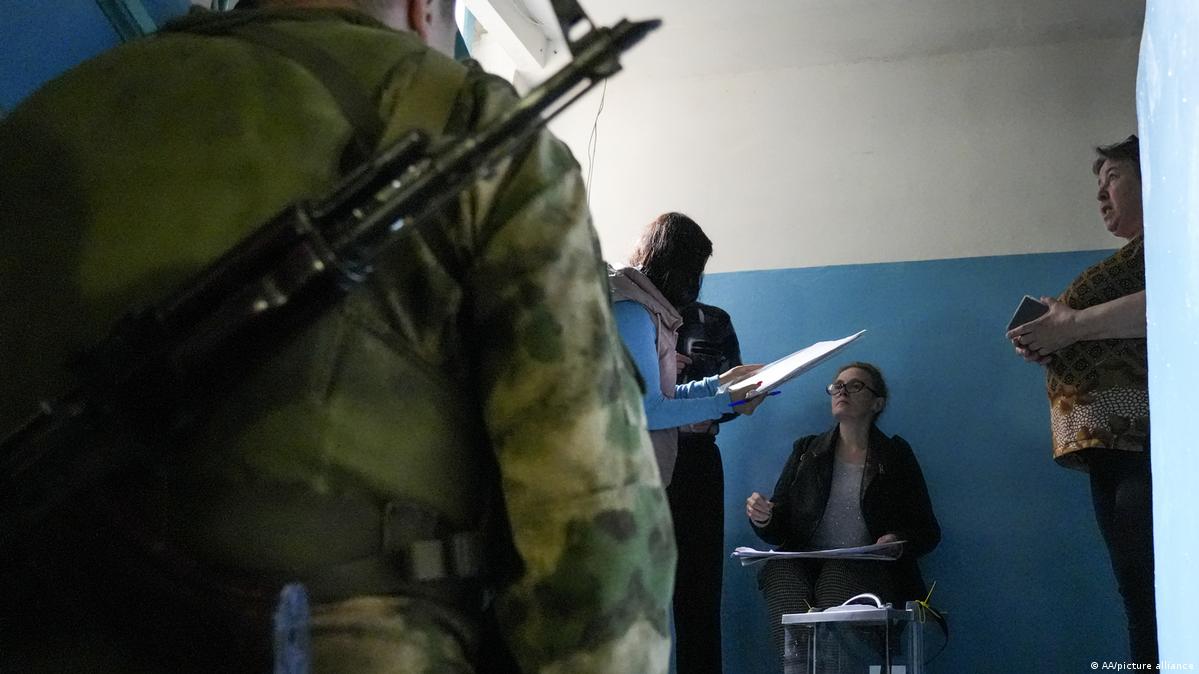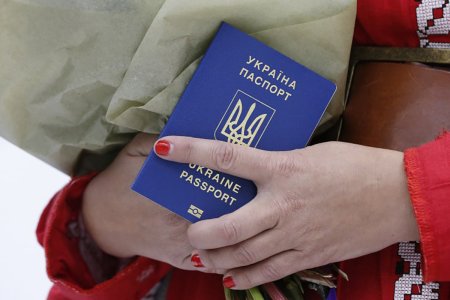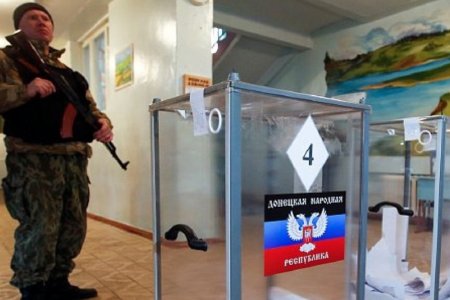
Russian president Vladimir Putin has signed a ‘decree’ which envisages deportation of Ukrainians from currently occupied parts of Ukraine’s Donetsk; Luhansk; Kherson and Zaporizhzhia oblasts for refusing to take Russian citizenship. In theory, such a refusal alone is not enough, however actions that constitute normal behaviour in Ukraine and any democratic country could be deemed to “pose a threat to Russia’s national security” and used as grounds for deportation of Ukrainians treated as ‘foreigners’ in their own country.
The decree *, signed on 27 April 2023, stipulates that Ukrainians living on occupied territory must either take on Russian citizenship or state that they do not wish to do so. Those who refuse the aggressor state’s citizenship will, from 1 July 2024, be considered ‘foreigners’. From then, should Russia choose to consider them a ‘threat to national security’, it will deport them. Such a supposed ‘threat’ could be seen according to Article 13 of the decree, in attending what Russia calls, “unauthorized meetings, rallies, demonstrations, processions or picketing”, with this claimed to be “attempts against public safety”. You will also be considered a danger to national security if they decide you support the liberation of occupied territory’ (with this described as “supporting the violent change of the basis of constitutional order of the RF”).
Another alleged justification for deportation would be what is called “financing or planning terrorist (extremist) activities”. Russia has long been applying its repressive legislation in occupied Crimea with actual or merely alleged, and unproven, involvement in religious or political organizations, which are entirely legal in Ukraine, used as justification for horrifically long prison sentences. It has already ‘convicted’ some of the Ukrainians abducted from occupied territory to Crimea or Russia and is planning a wrong series of extraordinary show trials, claiming that Ukrainians on their own territory were committing ‘acts of international terrorism’. Deportation, under such circumstances, is the least repressive of Russian weapons, but criminal, nonetheless.
As Ukraine’s Human Rights Ombudsperson, Dmytro Lubinets, put it, “Speaking the language of the occupiers, you can have lived in your own native land from birth, then one day become a foreigner on it. The RF can at any moment expel you from your native home, take away your property, forcing you to receive the ‘passport’ of the occupiers.”.
Lubinets stresses that this is in flagrant violation of both Ukrainian and international legislation. According to Article 7 of the Rome Statute of the International Criminal Court, the deportation or forcible transfer of the population constitutes a crime against humanity “when committed as part of a widespread or systematic attack directed against any civilian population, with knowledge of the attack:”
Mykhailo Savva from the Centre for Civil Liberties points out that this and a similar decree from late August 2022 were signed by Putin himself. He is effectively signing his name to proof of war crimes with these, in Savva’s words, weighty grounds for the next arrest warrant from the International Criminal Court. As reported, one is already in force against Putin and Maria Lvova-Belova, Putin’s protégé and so-called representative on children’s rights. Both are accused of promoting the forced deportation of Ukrainian to Russia, with both individuals actively boasting of their part in such attempts to kidnap Ukrainian children and ‘turn them into Russians’.
The new decree follows Putin’s signing of an illegal federal ‘law’ on 18 March 2023 which tries to deny Ukrainians citizenship of their own country and reports of a presidential ‘decree’ based on this and aimed at hunting out those who continue to use their Ukrainian citizenship. Kyiv has been swift in dismissing such measures and pointing out that such a ‘renunciation’ has no legal validity.
It has long been clear that, as earlier in occupied Crimea, Russia is using various forms of coercion to force Ukrainians into accepting Russian citizenship. According to Pavlo Lisiansky, Director of the Institute for Strategic Research and Security, Russia is also trying to force employees of all institutions and enterprises which are under Russian control to sign these ‘statements renouncing Ukrainian citizenship’. People are not being allowed to cross internal checkpoints, or the border between occupied parts of Ukraine and Russia without Russian citizenship and a signed ‘renunciation of Ukrainian citizenship.’
In addition, he says, the invaders have formed groups of security service officers who go around people’s apartments trying to coerce them into signing such ‘renunciation’. He says that cases have been recorded where local residents were detained after refusing to renounce their Ukrainian citizenship.
The coercion has been noted beyond Ukraine. On 24 April, for example, the United Kingdom’s Defence Ministry wrote that “The authorities in occupied areas of Ukraine are almost certainly coercing the population to accept Russian Federation passports. Russia is using passports as a tool in the ‘Russification’ of the occupied areas, as it did in Donetsk and Luhansk before the February 2022 invasion. Russia is likely expediating the integration of the occupied areas of Ukraine into the bureaucracy of the Russian Federation to help paint the invasion as a success, especially in the run-up to the 2024 presidential elections.”
Russia’s genocidal policy as far as Ukraine is concerned involves destroying Ukrainian identity. Another method used on more recently seized land, just as in occupied Crimea, has been to try to import Russian citizens in order to change the ethnic makeup of the population on occupied territory
Russia all but destroyed many cities in order to gain control of them (Mariupol; Sievierodonetsk; Lysychansk and other), and they are now encouraging Russians to settle there. Hanna Maliar, Adviser to Ukraine’s Minister of Defence, reports that the aggressor state is trying to change the ethnic makeup of land under occupation, and that such methods are most visible in Luhansk oblast. She explains that the Russian government has initiated the mass migration of Russian citizens from remote regions of Russia where the standard of living is very low.
All of the above has already been seen in occupied Crimea, where the occupiers made it all but impossible to not accept Russian citizenship and have on many occasions deported or banned Crimean Tatars or other Ukrainians known for their opposition to Russian occupation, their human rights activities, etc. The measures in newly seized parts of Ukraine are more aggressive and openly lawless, probably because Russia’s attempts to impose its citizenship on such occupied territories have run up against widespread resistance.
* http://publication.pravo.gov.ru/Document/View/0001202304270013?rangeSize=1&index=16



